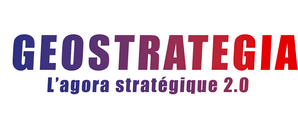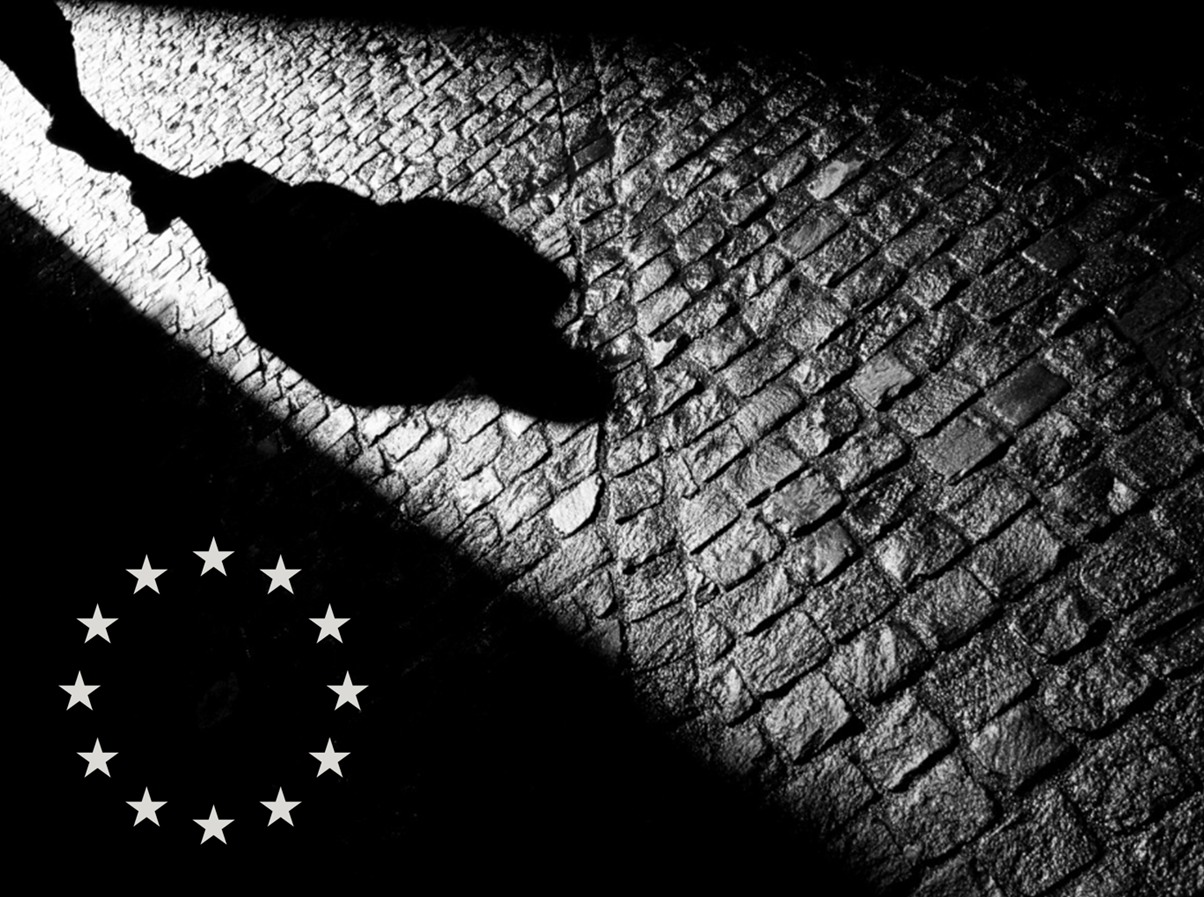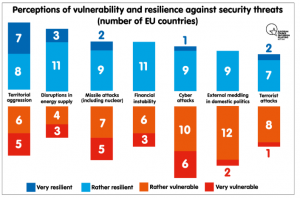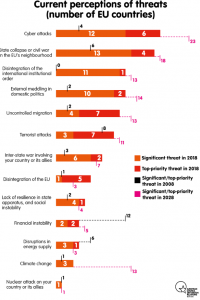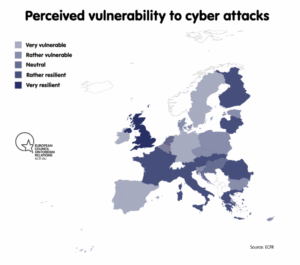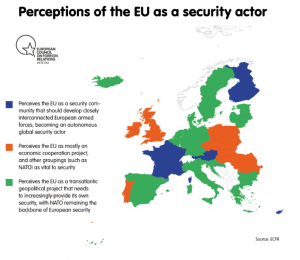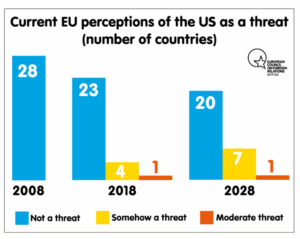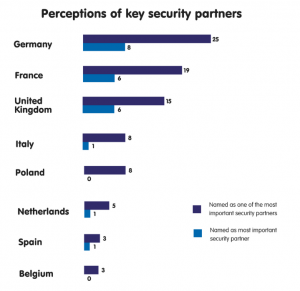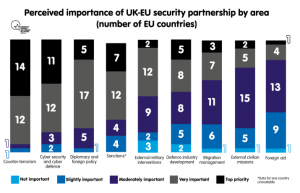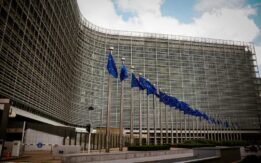Avec cet article, les auteurs présentent un tour d’horizon des craintes sécuritaires qui tourmentent les Européens. L’analyse met en lumière les convergences comme les différences d’appréciation face aux diverses menaces. L’étude souligne en particulier l’impact des cyber-menaces, du terrorisme ou encore la perception différenciée de la Russie. Les auteurs concluent l’analyse en proposant des orientations susceptibles de renforcer la résilience et l’engagement des populations face aux menaces.
Les opinions exprimées dans cet article n’engagent pas le CSFRS.
Les références originales de ce texte sont : Susi Dennison, Ulrike Esther Franke, & Pawet Zerka, The nightmare of the dark, « The security fears that keep europeans awake at night », ECFR.
Vous pourrez retrouver l’étude en suivant ce lien
Ce texte, ainsi que d’autres publications peuvent être visionnés sur le site de l’ECFR :
The nightmare of the dark, the security fears that keep europeans awake at night
In the nightmare of the dark
All the dogs of Europe bark,
And the living nations wait,
Each sequestered in its hate
– WH Auden, “In Memory of W.B. Yeats”, 1940
The security of the European Union is being challenged like never before. Central tenets of the international system that Europeans helped build are eroding or even disintegrating one by one. Great power competition is increasingly shaping Europeans’ security environment, while other security threats are also on the rise, from terrorism and cyber attacks to climate change.
The EU now faces security threats from its east and south – and an uncertain ally in the West.
To the east, a new kind of uneasy neighbourly relationship with Russia is developing – one that appears to involve Europeans accepting Russian meddling in their political affairs, from deliberate interference in elections to cyber attacks on European companies, systems, and political machinery. Further east, China continues to deepen its influence on EU states through trade and investment in the Union and its neighbourhood.
To the south, European countries now rely on cooperation with an increasingly autocratic regime in Ankara on some of the issues that their citizens are most concerned about, particularly migration and counter-terrorism. Meanwhile, conflicts and poverty on the other side of the Mediterranean, and the migration that stems from them, are increasingly challenging Europe’s security and even its solidarity.
Most importantly, to the west, US President Donald Trump is demonstrating a total disregard for the international agreements and norms that Europeans hold dear. By withdrawing from the Paris climate change deal, by pulling out of the Joint Comprehensive Plan of Action (JCPOA) on Iran’s nuclear programme, and by attacking the integrity of the international trading system through the unilateral imposition of tariffs, Trump has called into question Europeans’ formerly unshakeable faith in diplomacy as a way to resolve disagreements and to protect Europe. European leaders now fear that the transatlantic security guarantee will centre not on alliances and common interests but purchases of American technology and materiel – and on obeisance to an unpredictable president.
Europeans are – understandably – worried about this picture. But they are divided on how to handle it. The political crisis around immigration into the EU from 2015 onwards has revealed fundamental divisions in the way member states view their security. As Ivan Krastev has argued, “the refugee crisis exposed the futility of the post-Cold War paradigm, and especially the incapacity of Cold War institutions and rules to deal with the problems of the contemporary world.” For many Europeans, the migration crisis has called into question the ability of the EU and the global multilateral system to protect them.
There are divisions not only between but also within member states. In recent years, national elections across the EU have resulted in intense battles between political movements that favour an open, progressive agenda and global engagement, and those that prefer a nationalist, inward-looking approach that is, ultimately, anti-EU. In this unstable political environment, the need to keep citizens safe – a basic responsibility of any government – has taken on even greater importance. Safety is central to the nationalists’ increasingly popular arguments. They argue that mainstream EU governments have failed to protect citizens. In power, however, they face the inescapable dilemma that small European nations (and they are all small) cannot effectively respond to today’s threats through national policies alone.
Against this backdrop of worry and division, this report aims to understand security perceptions across the EU more fully and to search for common responses to protect the EU’s citizens. In April and May 2018, ECFR’s network of 28 associate researchers completed a survey covering all member states, having conducted interviews with policymakers and members of the analytical community, along with extensive research into policy documents, academic discourse, and media analysis. Based on this pan-European survey data, ECFR’s new report maps the security profile of all member states, identifying areas of agreement, points of contention, and issues on which they should cooperate to keep Europe safe.
The results reveal an EU that is fairly united in its understanding of the threats it faces, but that diverges significantly in the vulnerability it feels to those threats. This is not just a question of geography or size, since France and Germany, neighbours at the heart of Europe, fall nearly on opposite ends of the spectrum. France feels relatively resilient across the range of threats, while Germany thinks of itself as relatively vulnerable.
There are also important variations among the member states on what role the EU should play as a security actor. There is a near unanimous consensus that NATO must remain the backbone of European security, but EU member states differ significantly on the extent to which, within the NATO framework, Europe can or should begin to develop autonomy from the United States.
Finally, and somewhat sadly, given that there is no shortage of real threats for Europeans to be concerned about, our research paints a picture of an EU that is in some ways its own worst enemy. The responses on the preoccupation with immigration highlight the extent to which it is the political fallout of the migration crisis – its potential to increase support for populist parties and its use as a weapon in European domestic politics – and not migration itself that currently threatens the EU.
Rising fears
Europeans are united in their fear about the future. There is widespread agreement throughout Europe that security threats are on the rise: respondents to ECFR’s survey judged that the threats their countries faced intensified between 2008 and 2018, and will intensify further in the next decade. Today, the top five perceived threats are, in descending order: cyber attacks; state collapse or civil war in the EU’s neighbourhood; external meddling in domestic politics; uncontrolled migration into the country; and the deterioration of the international institutional order. Respondents expected the order of these threats to remain largely the same in the next decade (with terrorist attacks joining the deterioration of the international order in fifth place), and each threat to grow more intense in the period. Our researchers assess that, with the benefit of hindsight, the situation appeared to be slightly different in 2008, when the top perceived threats were, in descending order: economic instability and terrorist attacks; instability in the neighbourhood and disruption in the energy supply; and cyber attacks – of the kind Estonia experienced in April 2007.
The only threats that seem to have diminished in the past decade are those from financial instability and disruption in the energy supply. Respondents perceived all other threats to have intensified. They believed that the only threats that would diminish by 2028 were those from: an inter-state war involving their country or allies; the disintegration of the EU; disruption in the energy supply; and financial instability. They anticipated that all other threats would become more severe in the next ten years.
There has been little change in the international actors they perceive to be most threatening: jihadists continue to top the list, with Russia and international criminal groups sharing second place, and North Korea in third. Europeans expect these threats to persist until at least 2028. The most significant threat pertains to Russia. With Russia’s annexation of Crimea, perceptions of the country have shifted: in 2008, Europeans viewed Russia as the fourth largest threat they faced.
Given the frequency of terrorist attacks on European soil in 2008-2018, one might have expected a greater increase in Europeans’ fear of terrorism in the period, and in their projections on the threat’s severity in 2028. The reason why this is not the case might relate to a realisation that, rather than posing an existential threat, terrorism can be addressed through societal resilience. Member states are expecting the world to become more geopolitical: they expect the threats from jihadists, international criminal organisations, Russia, and North Korea to stay roughly the same in the next decade, and the threats from Turkey and China to grow in the period.
A divided union
The differences between EU countries’ threat perceptions form part of an oft-repeated narrative on European disharmony. For member states to create a coherent common defence and security policy, they need to define their fears and goals in a coherent way – perhaps borrowing (in style, if not in content) from the first NATO secretary-general’s famous claim that the alliance was founded “to keep the Russians out, the Americans in, and the Germans down”.
divisions are particularly sharp on security and defence issues, with the east mainly concerned about Russia and the south predominantly worried about terrorism. But the results of ECFR’s survey suggest that the picture is more complex than this. Divergences in European threat perceptions are less apparent than the prevailing narrative would suggest, with terrorism and migration having to some extent made the southern neighbourhood a pan-EU preoccupation, and with cyber attacks and information warfare having increased concern about Russia in member states outside central and eastern Europe. Nonetheless, disagreements over how to address threats could become the most significant obstacle to the creation of independent European defence capabilities.
It is striking that, if we look at the EU average, most threats are seen as moderate or significant. The only outlier is the use of nuclear weapons against a European country, considered to be only a minor threat. Hence (on an aggregate EU level), no one threat eclipses the others. However, these aggregated numbers hide divisions.
Unsurprisingly, eastern and southern Europeans were particularly concerned about uncontrolled migration into their countries. Indeed, Slovenia, Austria, Hungary, Bulgaria, Greece, Malta, and Italy saw this as the most significant threat they face. Concern about international crime is a southern story, with Greece, Malta, Spain, and Portugal (but also Slovakia and Austria) considering it a high-priority threat. Fear of terrorism is particularly evident in larger countries and those that have recently experienced terrorist attacks (the UK, France, Spain, Germany, Denmark, and Belgium). Concern about Russia is strongest in the east (Estonia, Romania, Lithuania, Poland, and Finland), although Germany and the UK also perceive it as a major threat. Estonia and Lithuania are especially worried about Russian meddling in domestic politics These divisions initially appear to confirm the narrative on a divided EU. But there are few actual contradictions among Europeans even when their top priorities diverge: threats that are a top priority for some EU countries are generally a significant threat for the rest, while issues that many view as benign are at most “somehow a threat” for others. Such broad alignments will ease the search for common responses. There are only two exceptions to this rule. The first is Turkey, which ten countries consider to be no threat but two others (Greece and Cyprus) see as their top threat. The most problematic division is in European states’ perceptions of Russia, which seven countries regard as the most important to their security and six others as a significant threat, but which five, predominantly southern, countries (Greece, Italy, Portugal, Hungary, and Cyprus) view as no threat at all.
The differences in perceived vulnerability may be even more problematic. For instance, 15 countries feel “very resilient” or “rather resilient” to threats against their territory, while 11 others feel “rather vulnerable” or “very vulnerable” to such threats. These 11 countries might be more supportive of a Europewide military build-up while the others might judge it unnecessary. Equally, 16 countries feel vulnerable, while ten others feel resilient, to cyber attacks. There are also fundamental differences between countries: Finland, for instance, claims to be highly resilient against all threats, whereas Estonia, Belgium, or Portugal generally feel vulnerable. In this context, there is an interesting juxtaposition between France and Germany: the former’s perceived resilience to all threats contrasts with the latter’s overall sense of vulnerability.
(Cliquer sur l’image pour une meilleure résolution)
ECFR’s survey thus shows that, over time, EU member states have not grown closer together on security and defence issues. While the disharmony narrative appears to exaggerate divisions between Europeans’ perceptions of threat (with the notable exception of the Russian threat), there are significant divergences between their perceived vulnerabilities. This, in turn, determines the urgency with which EU countries wish to counter threats, as well as their views on who should counter them and how they should do so.
Threatened by the new?
New threats have become a major concern. Three of the top perceived threats emerged relatively recently: cyber attacks, external meddling in domestic politics, and the collapse of the international institutional order [1].Europeans perceive these threats as having grown much more severe in the last ten years.
(Cliquer sur l’image pour une meilleure résolution)
Cyber is the area in which, according to ECFR research, EU countries feel most vulnerable. This is followed by external meddling in their domestic politics and then the more traditional threat of attacks on their territory. Interestingly, across the EU as a whole, these are also among the threats against which member states feel most resilient (a further indication of the extent to which it is difficult to talk about security perceptions shared across the EU). Large and/or wealthy member states (such as Denmark, Belgium, France, Germany, Spain, Sweden, and the UK) appear to be most concerned about cyber attacks – either in terms of their likelihood, impact, or manageability. This preoccupation must stem from an awareness of their societies’ reliance on digitised systems, since these countries are widely seen as “leaders” on cyber issues within the EU: France and Sweden have made significant progress in developing cyber strategies (and, indeed, France believes itself relatively resilient in this area); Denmark was the first member state to appoint a technology ambassador the potential loss of UK cyber cooperation after Brexit is, according to ECFR research, a cause for worry among member states.
(Cliquer sur l’image pour une meilleure résolution)
Who should protect Europeans?
EU member states broadly agree that NATO should remain the backbone of European security, and that the US should remain actively involved in Europe. But they differ on the role the EU should play in European defence.
(Cliquer sur l’image pour une meilleure résolution)
The US remains a crucial contributor to Europe’s security, both through NATO and as an independent actor. Interestingly, however, Europeans valued technical military and intelligence cooperation with the US above any other American contribution, including troop deployments on European soil. They also placed a premium on high-level political, technological, and practical cooperation with the US. This is exactly the type of cooperation that has suffered most with America’s new approach to European security under the Trump administration. European states are scrambling to address America’s gradual withdrawal from the rules-based international order,
and the administration’s decision to cast doubt on the US security guarantee for NATO allies. One answer could be to cater to US demands: 13 EU member states would be willing to make unspecified concessions to ensure that the US remained “in” Europe. But many of them would also opt to strengthen Europe’s capabilities: 14 member states advocate “pushing firmly for defence and security integration in the EU”, and 16 member states favour “upgrading and updating national defence capabilities by increasing spending”. Nonetheless, despite their greater willingness to do more for Europe’s security, Europeans are not quite willing to let go of the US. To many, the EU is still a transatlantic geopolitical project.
level of European autonomy from the US. Some believe that an increased EU role in European security and defence will make them safer and allow them to survive without the US, if needed; others want to use enhanced European capabilities in these areas to convince the US to stay engaged with Europe; others still worry that, by improving its capabilities, the EU will compete with NATO and thereby weaken the transatlantic bond. It is here that the EU faces its most significant problem, as these gaps appear to be unbridgeable – even through flexible solutions do not need to include all member states. If some states believe that increasing European defence cooperation will ultimately threaten Europe’s security by weakening the transatlantic bond, they will likely be unwilling to allow others to build an integrated European defence order. Proceeding with flexible integration might, once progress is made and credibility regained, alleviate many of their current fears. But there is a real danger that some member states will become spoilers in others’ security projects.
In this context, Europeans’ views on whether the US is a threat could be decisive, because a shift in these views could help clear the way for such projects. No EU member state views a threat from the US as a priority issue. However, a minority of member states believe that the US is either “somehow a threat” or a “moderate threat”. According to ECFR’s survey, the number of EU states that view the US in this way will rise from 5 to 8 between 2018 and 2028. The rules of geopolitics are shifting, as European leaders have acknowledged ever more explicitly during Trump’s time in the White House. After attending the 2017 NATO summit and G7 meeting in Italy, German Chancellor Angela Merkel commented in May 2017 that “the times in which we could rely fully on others – they are somewhat over” [2]. By June 2018, following Trump’s 11th-hour withdrawal from the G7 communiqué, she had hardened her position to “we, as Europeans, have to take our fate more into our own hands” and raised the issue of “where must we be able to intervene alone” [3].
(Cliquer sur l’image pour une meilleure résolution)
Germany: centrist or outlier?
Because of its size, location, and economic power, Germany has always been a central player in the EU. ECFR’s survey shows the extent to which this is true even in security and defence – areas in which, for historical reasons, the country has shown marked reticence. A striking 25 EU countries (all but Portugal and Cyprus) name Germany as one of their “most important partners in security”. Although this seems to support the narrative on a Germany-centric, huband-spokes Europe that has gained acceptance in recent years, the reality is more complex. Germany may top the list, but the much lower number of eight countries see it as their most important partner, while survey respondents named 22 other countries as an important security partner. The multilateral EU, it seems, is alive and well.
(Cliquer sur l’image pour une meilleure résolution)
Despite some recent movement towards increasing its defence spending, Germany continues to see itself as a “civilian power”. Sometimes, the justification for this stance centres on the argument that other European powers, particularly those that suffered under Nazi occupation during the second world war, would not accept a more militarily capable Germany. However, ECFR’s survey shows that there is little basis for this argument. None of the 28 EU member states expressed concern about Germany upgrading its armed forces, increasing its defence spending, or participating more in military missions. Rather, 15 countries would “highly welcome” these changes. Among ruling European parties, only Poland’s Law and Justice cultivates fear of Germany rooted in the second world war – and even it would still like to see Germany increase its military spending as a contributor to NATO. Moreover, the stark contrast in our research findings between a confident France, which regards itself as resilient across the board, and Germany, which feels vulnerable in most areas, underlines the importance of perceptions in threat assessments. Perhaps the extent of the debate in Germany about the kind of security actor it should be plays a role in perpetuating this sense of vulnerability, whereas France’s strategic posture, which has been relatively constant between recent administrations, is subject to review but not to the same level of debate. With the advent of the Trump administration, the transatlantic relationship has taken a major hit. Nowhere is this more visible than in US-German relations. As noted above, several countries have expressed concern about the United States’ trajectory, noting that the US may have become “somehow a threat”. Only Germany regarded the US as “a moderate threat” in 2018. Trump’s anti-German rhetoric and protectionist trade policies have damaged “export world champion” Germany more than any other EU country. This is likely to put the country and its leader in a particularly awkward position. Merkel has always rejected the notion that the German chancellor could become the leader of the free world in the US president’s stead. But Germany’s special position in Europe means that it is especially problematic for it to have such a poor relationship with the US.
What is to be done?
How can Europeans allay their fears about the future? How should they equip themselves to cope with an increasingly threatening environment?
Security begins at home, or so the dictum goes. It is hard not to be reminded of this when considering the security issues that preoccupy EU member states. In the responses to ECFR’s survey, there is an undercurrent of concern that the EU is doing too little to address its perceived vulnerabilities. This concern seems particularly acute in relation to possible attacks from Russia. The Russia-related issues that concern Europeans most are: the likelihood of cyber attacks; an inability to effectively respond to interference in domestic politics; a lack of adequate defences against information warfare; and the pliancy of European public opinion. (Hungary was the only member state that equated such interference with Brussels; all others identified Russia as the main threat in this area.)
Europeans believe that they are especially vulnerable to cyber attacks and interference in domestic politics. This suggests that the EU and its member states should prioritise efforts to build resilience in the face of these threats. By focusing primarily on the threat rather than the actor that many – but not all – see as responsible, Europeans may find new ways to bridge their differing perceptions of Russia. They have already done so in some areas, as seen in the Greek-led Cyber Threats and Incident Response Information Sharing Platform and the Lithuanianled Cyber Rapid Response Teams and Cyber Mutual Assistance Programme under PESCO, as well as the European External Action Service’s Strategic Communications Division. But dealing with cyber attacks when they come, or information warfare in the heat of the battle, will only ever be part of the answer. To address the areas in which Europeans feel most vulnerable, the EU will also need to build resilience closer to home. The weakest links in any computer system – those that hackers are most likely to target – are usually accounts or data held by private citizens. Improving their understanding that they are actors in cyber security (and not only victims of inadequate protection) will be crucial. Similarly, Europeans should not only be concerned that external actors are able to manipulate information, but also that many of their fellow citizens – as consumers of information and as voters – find these arguments persuasive, or are unable to identify fake news. European leaders need to improve public understanding of these issues, and to display courageous and creative political leadership in developing convincing alternative narratives to that of inward-looking nationalism on issues voters care about.
ECFR’s survey suggests that Europeans’ intense concern about migration – which the spring 2018 Eurobarometer identifies as the most significant issue the EU faces – is in no small part of their own making. Their primary fear is not that terrorists will enter Europe via migration routes (although some expressed concern about this) but rather that migration will create damaging political fallout within the EU. The issue that most concerned respondents (representing 17 member states) was an inability to control the number of refugees arriving in Europe. But this is not in itself a security threat: even at peak levels of the migration crisis in 2015 and 2016, the EU was able to absorb the number of arrivals collectively – although the per capita levels of arrivals posed challenges for member states such as Austria, Germany, Malta, and Sweden [4]. But an inability to control the number of arrivals potentially poses a political threat to the government in any EU member state, given that the debate around the issue has become so toxic.
The second most common reasons for concern about migration were an inability to control the type of migrants that arrive in Europe, and the impact of this on member states’ capacity to work together (11 member states). They have reached an impasse on migration due to battles between member states with shared borders; between supporters and opponents of the controversial relocation scheme introduced in 2016 as a way to share the burden of arrivals internally; and between those who want to change the Dublin system – principally, states on the EU’s southern border – and those that want to preserve it – largely, those that only border other EU countries. (The UK is absent from this discussion because it is preoccupied with negotiations on its departure from the EU.) The hardened positions emerging from the new Five Star/Lega government in Italy and the Christian Social Union in Germany in recent weeks have only intensified these battles.
European policymakers must work with citizens and the political environment in their countries if they are to address security challenges. There is a need to reassess the EU’s ability to implement migration deals that promise “mobility partnerships” (increased numbers of visas to work in the EU for third countries, in return for them hosting migrants who failed to meet EU entry criteria). Deals that fail to deliver the promised control over migration into Europe only add to European citizens’ sense of vulnerability, and third countries’ doubts about the EU’s credibility. Resolving the political crisis around migration will require stronger political leadership within the EU – to rebuild a consensus on a collective European answer to increased migration levels that aligns with the EU’s founding principles of openness, tolerance, and fairness – as much as border management or foreign and security policy.
Furthermore, Europe needs to build up its defence capabilities – and not because Trump is telling it to. Few of the greatest perceived threats to the EU are directly linked to these capabilities. But the more secure Europe is in a conventional sense, the more robust it can be in its response to actors posing new threats. And responses to many of the threats that most concern member states – including terrorism, and the risk of state collapse in Europe’s neighbourhood – will have a defence component, either through military deployments or, indirectly, efforts to improve geopolitical standing.
The two arms of foreign and security policy are mutually reinforcing: although threats may be evolving, an adversary’s awareness that it is at a military disadvantage will always strengthen the hand of European diplomats. In a world of hybrid threats and geopolitical competition among actors who trade in all types of power, EU states cannot afford to ignore the utility of force.
They are gradually realising this. Merkel has recognised that Europe’s security order cannot be principally based on the transatlantic partnership when the gap in world views between leaders on either side of the Atlantic is too wide. She has also acknowledged that, to become a security power commensurate with its economic importance, the EU needs to rethink its calculations on military capability. French President Emmanuel Macron wants to strengthen Europe’s intervention capabilities, and he aims to harmonise European strategic culture through increased military exchanges. To prepare for the turbulence Europeans expect from the future international environment, the EU will need to invest more in everything from intelligence and cyber capabilities to development aid. The focus of this effort should be not only increasing overall levels of investment, but also increasing its effectiveness through improved targeting. As our colleague Nick Witney has argued, “European dependence on American protection is absurd, given that the 28 EU member states between them are second only to the US in their defence spending, and in 2017 outspent Russia by a factor of [3.5].”
The launch of PESCO is a good thing – as is growing political coordination between EU states on security and defence. Three-quarters of respondents to ECFR’s survey believed that PESCO contributed to their country’s security. But, at its most basic level, the process of working together, thereby strengthening collective responsibility for European security and defence, is important in itself as the groundwork for developing a more robust security posture.
In this context, member states should keep in mind that their overriding goal should be European rather than EU security and unity. European citizens’ growing security fears should be seen not as a catalyst for unifying the EU but the impetus for improving Europe’s defences inside or outside the Union. “Mini-lateral” initiatives – such as the French-led European Intervention Initiative (which as of its June 2018 launch included the UK and was open to third countries) and the British-led Joint Expeditionary Force – create opportunities for cooperation between countries with similar strategic cultures and threat perceptions.
Brexit may hamper such efforts. Nearly two-thirds of respondents to the survey suggested that the UK’s departure from the EU would have a negative or very negative impact on their security. Just as the EU27 felt most vulnerable in many of the same areas, they broadly agreed on the security issues they expected to address in cooperation with the UK after Brexit. Respondents most often described counter-terrorism, cyber security and cyber defence, and sanctions as the most important elements of cooperation. Yet both the UK and the EU27 are allowing a row over the Galileo satellite project and the wider Brexit negotiations to sour talks on their future security partnership. It is possible that the sides need a cooling-off period to prevent them from accidentally sabotaging arrangements crucial to European security.
(Cliquer sur l’image pour une meilleure résolution)
Recognising that geopolitical competition is likely to intensify during the next decade, EU states need to continue to invest in the diplomatic capacity necessary to pursue an assertive foreign policy as a crucial element of European power. There is a broad range of urgent foreign policy challenges that has a major bearing on European security – from salvaging the JCPOA and defining the EU’s relationship with the western Balkans to determining Europe’s relationship with African countries in an era of large-scale migration. Only Europe’s best diplomatic minds can meet these challenges.
More immediately, the EU needs to remain united through the upcoming NATO summit. As discussed above, EU countries are divided between those that believe increased European defence cooperation will ultimately hurt Europe’s security by weakening the transatlantic bond and those that wish to respond to an unreliable US by further integrating Europe. These differences in world view will not disappear in time to confront Trump’s call for Europeans to spend more on defence (particularly American technology and materiel) or to significantly reduce European dependence on the US. But by adopting a more flexible, multispeed approach to their security, Europeans may begin to carve out autonomous strategic capabilities.
References
Par :
Source : European Council on Foreign Relations

